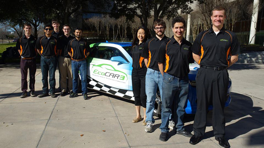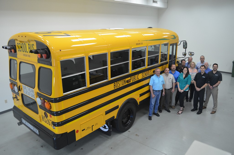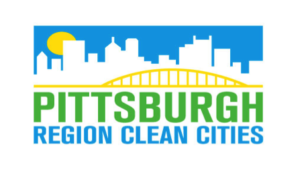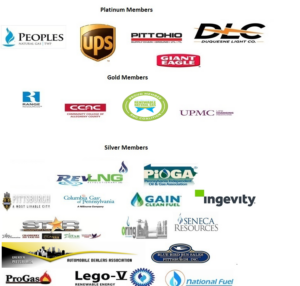by Jeff Twardy | Jan 22, 2016 | Articles, January 2016 Newsletter
NGVAmerica applauds House and Senate passage of a five year surface transportation bill. The Fixing America’s Surface Transportation (FAST) Act includes significant provisions to advance natural gas as a transportation fuel that have been advocated by NGVAmerica. “Congress recognizes the value of using clean-burning natural gas in transportation, and the FAST Act will help put more natural gas vehicles on American roads,” said Matthew Godlewski, President of NGVAmerica. “This legislation will assist fleets and consumers transition to cleaner, low-cost, domestic natural gas to power their vehicles.” Provisions contained in the FAST Act include a weight exemption that allows heavy-duty natural gas trucks to exceed the federal weight limits up to 82,000 pounds to compensate for the additional weight of natural gas fuel systems and tanks. This commonsense provision would level the playing field for natural gas trucks that are currently unable to haul the same amount of freight as diesel-powered trucks. Another key provision creates regulatory parity for NGVs by allowing automakers to more accurately calculate fuel economy of bi-fuel NGVs. The current credit assumes bi-fuel NGVs operate 50 percent of the time on gasoline instead of natural gas, and therefore do not fully reflect the benefits of bi-fuel natural gas vehicles. Additionally, the FAST Act includes provisions that: expand the Congestion Mitigation and Air Quality Improvement (CMAQ) Program to, among other things, clarify that port facilities qualify for funding; create alternative fuel infrastructure corridors, including natural gas fueling stations along major national highways; and extend a state’s ability to provide HOV lane access for NGVs and other dedicated alternative fuel vehicles until 2025. “NGVAmerica commends Sen. James Inhofe (R-OK)...

by Jeff Twardy | Jan 22, 2016 | Articles, January 2016 Newsletter
The communications team for Penn State’s Advanced Vehicle Team placed second among 16 teams competing in the national EcoCAR3 competition. The team won first place for both its communications plan and the implementation plan, second place for its media relations report and third place for its outreach event presentation. Comprised of 13 undergraduate and graduate students from the College of Communications and the College of the Liberal Arts, the communications team has developed relationships with local media and coordinated outreach events to educate Centre County residents about the benefits of alternative vehicles and the importance of sustainability. “We were so close to winning the first place,” communications manager Donghee Lee said. “I’m still excited that all our work paid off. I appreciate the hard work of all the team members.” Penn State amassed 72.1 of a possible 75 points in the competition. Ohio State won with 72.8 points and West Virginia was third. Penn State has participated in advanced vehicle technology competitions since 1988. The overall team is comprised of between 50 to 70 undergraduate and graduate students, faculty and staff. Along with the communications team, whose efforts have been honored among the nation’s best in recent years, engineering students largely focus on the vehicle itself. Currently, the team is involved in EcoCAR3, a four-year program that runs through 2018 and tests students from the 16 different universities to re-engineer a Chevrolet Camaro to increase fuel efficiency, degrease harmful emissions and maintain performance, safety and consumer acceptability. The team does most of its work at Penn State’s Thomas D. Larson Pennsylvania Transportation Institute. General Motors provides each of the...
by Jeff Twardy | Jan 22, 2016 | Articles, January 2016 Newsletter
CP Industries, a Pennsylvania-based manufacturer of seamless high-pressure vessels for Industrial Gas, Offshore, Defense and Alternative-fuel storage applications has announced several organizational changes. Mr. Kevin Collins, VP of Sales & Marketing, has retired from the company after more than 30 years with CPI. Kevin will remain at CP Industries on a part-time basis as an independent consultant to key accounts across all market segments both domestic and international. Kevin has significantly contributed to the success of CPI and we thank him for that. Please join us as we welcome Mr. George H. Thompson as our new Vice President of Sales and Marketing to replace Mr. Kevin Collins. George grew up in Oakmont, Pennsylvania and has recently returned to Oakmont after spending time in Texas. He is a graduate of Allegheny College and has a son, George III, 15 and a daughter, Libby, 12. George has a wealth of knowledge from US Steel where he held executive positions in sales, marketing and manufacturing at various locations throughout the United States. George will be working to align CPI’s commercial activities with our customer’s needs. Michael Larsen, President of CPI, commented, “These organizational changes combined with our LEAN effort and new product developments over the last four years will ensure that we maintain our leadership position in our end markets and with the customers that we...

by Jeff Twardy | Jan 22, 2016 | Articles, January 2016 Newsletter
The Propane Education & Research Council donated $10,000 to Boston Public Schools to recognize its effort to improve students’ health, safety and education. The school district adopted Boston’s first propane autogas powered bus fleet, adding 86 Blue Bird Vision Blue Bird Vision Propane buses. These alt fuel buses will save the district up to $1,000 per bus annually and significantly reduce its diesel consumption. PERC partnered with former first daughter and teacher Jenna Bush Hager and AdoptAClassroom.org to present the middle school’s teachers at Lilla G. Frederick Middle School with the money for classroom supplies, books and outdoor equipment. This is a part of PERC’s new campaign to educate consumers about the benefits of transitioning away from diesel to clean, domestic propane autogas. “It’s clear when you talk to school administrators and transportation departments that they are saving more than just dollars and cents by going with propane buses,” said Bush Hager. “The switch is improving their school as a whole and giving them the opportunity to invest in more teachers or school programs.” Donations like this from PERC and wise decisions by school districts to choose a more cost-effective, domestic fuel option like autogas will help put money back where it belongs — in the classroom and U.S....
by Jeff Twardy | Jan 22, 2016 | Articles, January 2016 Newsletter
On Friday, December 18th, President Obama signed the Consolidated Appropriations Act of 2016 (H.R. 2029). Division Q, the Protecting Americans from Tax Hikes Act (PATH Act), retroactively extends many tax credits. There are several PATH Act provisions with implications for Clean Cities portfolio items: Alternative Fuel Infrastructure Tax Credit. Section 182 extends the tax credit for alternative fuel infrastructure through December 31, 2016. Fueling equipment for natural gas, propane, liquefied hydrogen, electricity, E85, and biodiesel are eligible for a tax credit of 30%, up to $30,000. Residential fueling equipment may receive a tax credit up to $1,000. Alternative Fuel Excise Tax Credit. Section 192 extends the $0.50 per gallon tax credit for alternative fuels, including liquefied hydrogen, through December 31, 2016. Alternative Fuel Mixture Excise Tax Credit. Section 192 also extends the $0.50 per gallon tax credit for alternative fuel used to produce a mixture containing at least 0.1% gasoline, diesel, or kerosene through December 31, 2016. Alternative fuel blenders must be registered with the Internal Revenue Service (IRS). Qualified Two-wheeled Plug-In Electric Drive Motor Vehicle Tax Credit. Section 183 extends the two-wheeled plug-in electric drive motor vehicle tax credit through December 31, 2017. Qualified vehicles are eligible of a tax credit for 10% of the cost of the vehicle, up to $2,500. Fuel Cell Motor Vehicle Tax Credit. Section 193 extends the $4,000 tax credit for the purchase of qualified light-duty fuel cell vehicles through December 31, 2016. Biodiesel Income Tax Credit. Section 185 extends the biodiesel income tax credit through December 31, 2016. A taxpayer that delivers unblended biodiesel (B100) into the tank of a vehicle may be eligible...



